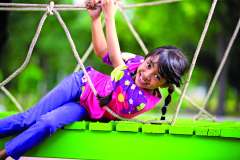Developmental-Behavioral Pediatrics (DBP) Fellowship
Developmental-Behavioral Pediatrics (DBP) Fellowship
About the Fellowship Program
The DBP Fellowship Program is an ACGME accredited three-year training program, which aims to prepare fellows for academic leadership careers in the field of Developmental-Behavioral Pediatrics, based on their exceptional clinical skills, cutting-edge research contributions, outstanding education and training skills, and effective advocacy for children and families.
Our comprehensive curriculum provides the flexibility and guidance to pursue careers within the broad spectrum of the field of Developmental-Behavioral Pediatrics, and establishes a solid foundation in the current study and practice of this specialty.
Program Director:
Assistant Professor in Pediatrics
310-794-7165 (Phone)
310-206-4215 (Fax)
Nia Ricketts
Fellowship Program Coordinator

Goals
- Understanding the developmental processes of infants, children, adolescents and young adults, in the context of their families and communities.
- Understanding the biological, psychological, and social influences on development in the emotional, social, motor, language, and cognitive domains.
- Identification and treatment of disorders of behavior and development throughout childhood and adolescence.
- Have a meaningful supervised research experience in an area of study related to developmental-behavioral pediatrics, with the goal of a first author publication and presentation at a national meeting.
- Provide medical students, pediatric residents, providers from pediatric primary care and community partners with the knowledge and skills to promote systems-change, improve access to care and enhance the quality of life for children with developmental-behavioral problems.

Timeline
The DBP fellowship program begins with a primarily clinical first year during which trainees learn about a range of developmental and behavioral pediatric conditions. Fellows refine their research project focus within the first year and each fellow uses the final two years of the fellowship to develop an area of clinical expertise while conducting a mentored research project and gaining knowledge and skills in quality improvement as well as participating in outreach into the community.
Clinical Experience
Fellows develop their clinical skills working with their patients longitudinally in a weekly follow-up clinic as well as being members of multidisciplinary assessment teams for Autism, Cerebral Palsy and Learning difficulties. Elective experiences may include clinical rotations in our High Risk Infant Follow-Up Clinic, Genetics and Psychiatry clinic, and a variety of other clinical programs at UCLA.
Seminars
Weekly seminars address topics in developmental-behavioral pediatrics, behavioral neurology, child psychiatry, educational methodology for teaching, research methodology and professional development.

Research Expectations
Within the first year the fellow meets with potential research mentors to discuss possible areas of research, chooses a mentor and the area of the research project and begins meeting with the research team.
A literature review is started in the area chosen and the fellow begins reading the necessary background material. It is expected that by the end of the first year the fellow will have selected a specific research mentor and area of research.
During the second year the fellow continues working closely with the research mentor and research collaborators on project design. It is expected that by the end of the second year the fellow will have obtained all necessary training, Institutional Review Board (IRB) approval and will be ready to implement the research project.
It is expected that during the third year, under the guidance of the faculty research mentor, the fellow will complete data collection, data analysis and prepare a written summary of the research. The fellow is strongly encouraged to present research at local and national meetings as a poster presentation and submit research findings to a peer-reviewed journal.
A key element of the research program is mentorship. The portfolio of ongoing and funded projects within the division and across the campus assures that DBP fellows have access to exciting and productive research training opportunities and outstanding mentors.

Fellowship Application
Eligibility criteria for fellowship training at UCLA
- MD (Medical Degree) or equivalent
- US Citizenship, Canadian Citizenship, or permanent resident status in the United States. For Non-Citizens: The post-residency fellowship program can accept applicants on J1 Visas but does not sponsor international medical school graduates on H1B Visas.
- All applicants must have completed their residency from an ACGME-accredited program in either the U.S. or Canada.
- Expectation of satisfactory completion of requirements for Certification in Pediatrics by the American Board of Pediatrics
- UCLA participates in the National Residency Match Program (NRMP). You must register with the NRMP, and provide us with your NRMP #
- California Medical License (at the time of starting fellowship)
- To find out more about UCLA Fellowship Salaries and benefits, Life in LA and other information please visit the UCLA Graduate Medical Education website.
Application Process
The DBP Fellowship Program utilizes the . To register with ERAS and review information regarding application procedures, requirements and deadlines please visit the . Please visit the for additional details regarding the match process and registration information.
Paper applications will not be accepted. From received applications, we will invite a select group of prospective applicants to interview at UCLA. Selected prospective applicants interview virtually (Zoom) at UCLA.
Required documentation to be submitted via ERAS
Please submit a completed ERAS application, which includes the following documentation:
- Medical School Transcript (certified English translation if from foreign institution)
- Three letters of recommendation (more than three is optional)
- Personal Statement
- Current CV
- USMLE transcript with scores to date
- MSPE/Dean's Letter
- Photograph for ERAS system (optional)
Fellows
3rd Year
Megan Lane, MD
Medical School: University of Tennessee, Health Science Center, College of Medicine
Residency: UC Irvine
2nd Year
Priya Dakshnamoorthy , MBBS
Medical School: A.C.S. Medical College and Hospital
Residency: Texas Tech University
1st Year
Elizabeth Volpicelli, MD
Medical School: Temple University School of Medicine
Residency: UCLA